1. When Ralph admits to Piggy that they all murdered Simon, what is Piggy's reaction?
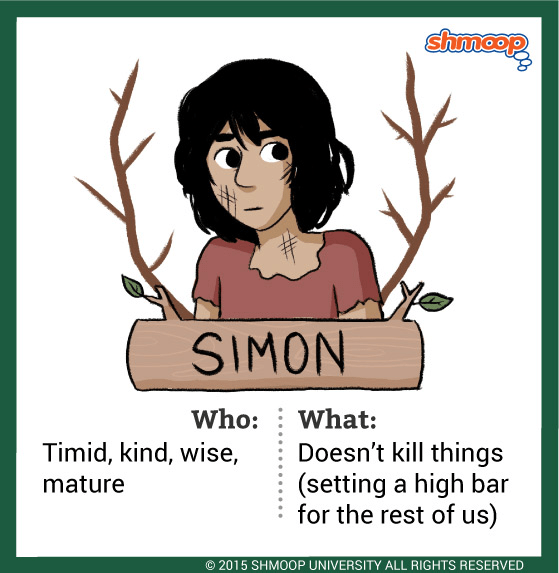
1. Piggy makes excuses, saying that it was dark and there was the dance, the lightning, thunder, and rain–that they were scared.
1. After all that has happened, why does Piggy still try to reason with Jack to get his glasses back?
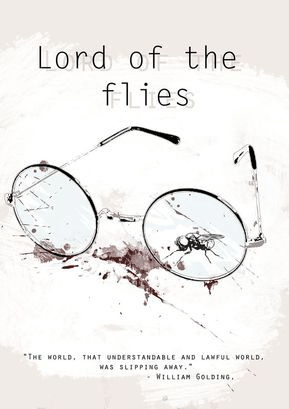
1. Piggy feels totally helpless without his glasses. He is desperate and believes that Jack can’t do anything worse to him. Piggy lives by logic and reasoning and still can’t believe that Jack can no longer be reached with logic.
1. What realization does Ralph come to about the savages and Jack? Why?
1. Remembering the deaths of Piggy and Simon, Ralph realizes that the savages (a) will only go further and further. He acknowledges the indefinable connection between him and Jack and (b) knows that Jack will never let him alone.
10-6. When Ralph tells Piggy that he is frightened "of us" and wants to go home, he is echoing Simon's earlier statement that perhaps the boys themselves are the beast.
a. Was Simon right? b. Does Ralph have reason to be frightened "of us"? Explain.
10-6. At this point in the novel, it is clear to the reader, who has the advantage of knowing
(a) there is no real beast, that Simon’s early prediction was accurate. The only real threat to any of the boys is their own disintegration into beastly behavior.
Ralph (b) does have reason to be frightened “of us” since the boys have murdered one of their own.
Trace the development of the relationship between Ralph and Piggy.
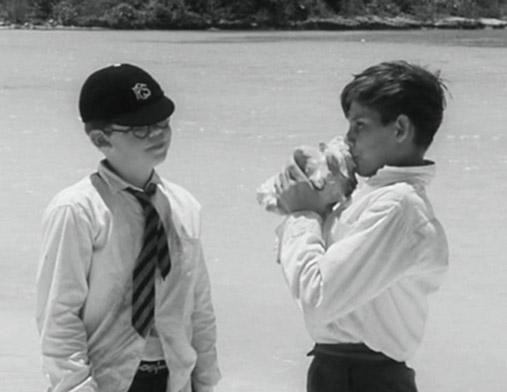
When Piggy first spots Ralph on the beach and attempts to make friends, Ralph shows no interest in Piggy. He doesn’t even bother to ask Piggy’s name. After the other boys convene on the beach, Ralph carelessly makes Piggy a source of derision (ridicule or mock), telling the boys Piggy’s nickname after Piggy had specifically asked him not to do so. In addition, he adds to Piggy’s sense of humiliation by refusing to allow Piggy, who feels he has a right, to join the expedition. However, as time progresses and the conflict between Jack and Piggy surfaces and intensifies, Ralph becomes Piggy’s advisor and companion. Ralph finally acknowledges to himself, without jealousy, that Piggy is wiser and can think better than he can, that Piggy has the qualities for leadership. After Jack steals Piggy’s glasses, it is Piggy, not Ralph, who takes charge and makes the decision to confront Jack. At this point, Piggy becomes the leader and Ralph the follower. When he is forced into hiding by the tribe, Ralph knows that he will have to think for himself, acutely missing Piggy’s ability to talk sense. In the end, Ralph weeps over Piggy’s death.
2. What does Ralph say to Piggy's remark that they were all scared?
2. Ralph admits that he doesn't know what he was feeling, but he wasn’t scared.
2. Why do the twins suggest they all paint their faces before going to see Jack?
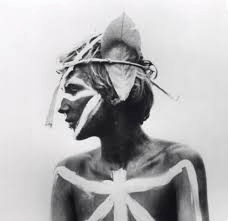
2. The twins are intimidated by the boys with the masks. They intuitively understand that the masks give these boys a certain power over them. They feel that if they, too, have masks, somehow the balance of power will be equal.
2. Describe the scene in which Ralph comes upon the pig's skull on the stake. Explain what he does, and why.
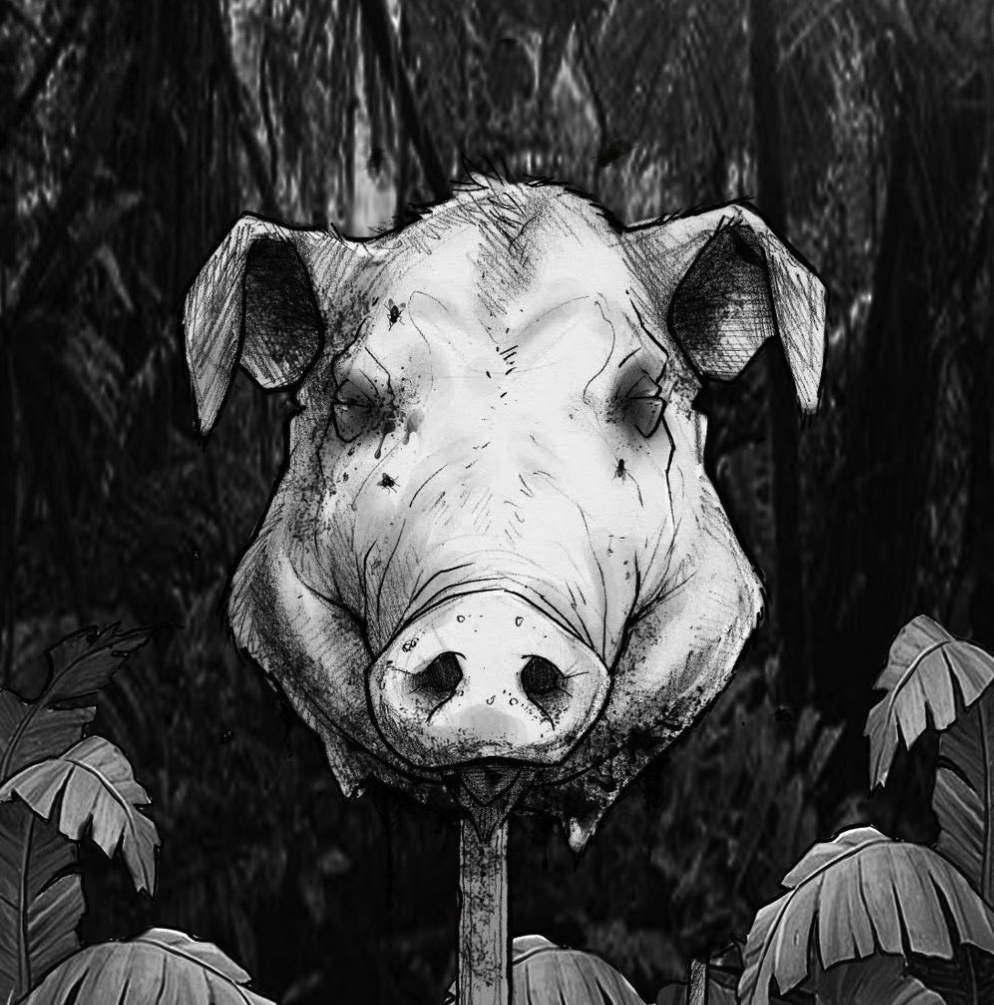
2. The (b) sow’s skull appears to be mocking Ralph. Fear and rage sweep over Ralph and he strikes at the skull. It bobs back like a toy, still grinning in Ralph’s face. (a) He lashes out at it with his bare knuckles, breaking the skull into two pieces, and then wrenches the stick from the crack and holding it as a spear, backs away from the broken skull.
10-5. As Ralph and Piggy discuss what has happened to Simon, Ralph admits the truth but Piggy rationalizes the situation. a. Which response is more typical of human beings in general? Why? b. What do the two boys' responses indicate about each of them?
In general, human beings tend to rationalize their behavior and are often unwilling to accept responsibility for their conduct and actions. The fact that (b) Ralph is willing and able to acknowledge what he did indicates a heightened maturity and self-awareness. Ralph is an exception to the general rule of rationalizing behavior. Piggy, however, (a) typifies the general tendency to be dishonest with oneself and to try to justify wrongdoings.
Discuss the role of the Lord of the Flies as a "character" in the novel.
The staked sow’s head, the Lord of the Flies, is a character in the sense that it engages in dialogue with Simon. It is a symbolic character, the physical embodiment of the inherent evil within humankind. It is the mirror image of Simon’s, and all of humankind’s, baser nature. This character, in its conversation with Simon, clearly states the message the author is trying to convey to the reader: the Lord of the Flies, evil itself, is a part of every person and the cause of mankind’s problems. It moves to protect itself by warning Simon that if he interferes, or tries anything, he will die.
3. a. Piggy suggests that they let the signal fire go out at night and relight it every morning. Why? b. How does Ralph react?
3. (a) Piggy suggests that no one will see the smoke in the dark. Sam and Eric point out that there are only four of them to keep the fire going, and they can’t do it. Ralph finally agrees, but he feels frustrated and disappointed.
3. (a) Jack boasts that his tribe does whatever he wants. Why is this true? (b) Why might the boys prefer Jack's leadership to Ralph's?
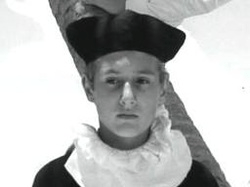
3. (a) The boys are afraid of Jack and therefore do whatever he says. (b) Jack does their thinking for them, and they do not have to take responsibility for their acts. Jack acts as though he is not afraid and knows all the answers, whereas Ralph admits his doubts and fears.
3. What is Ralph dreading most?
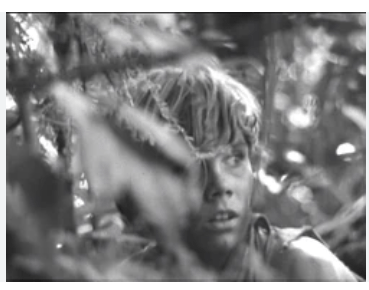
3. Ralph dreads the curtain that might waver in his brain, blacking out his sense of danger and making a simpleton of him.
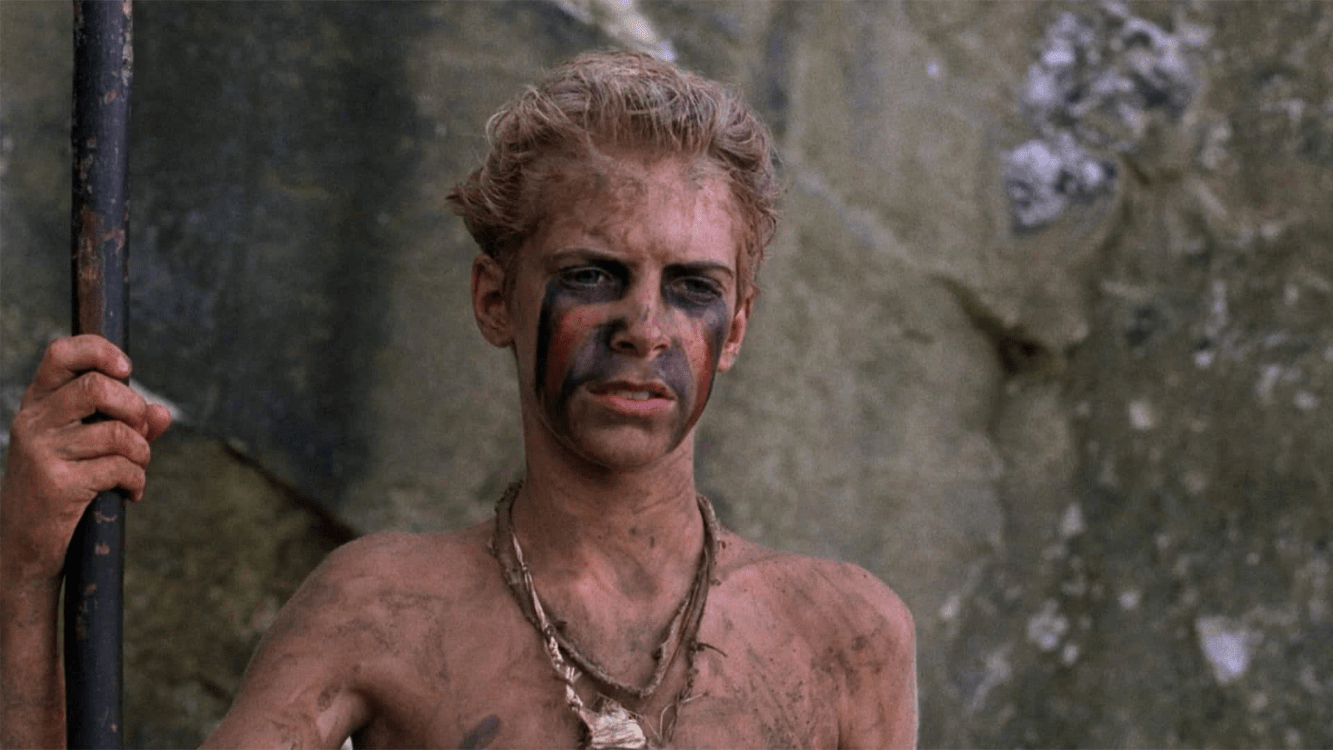 10-7. a. What does Jack's denial that they killed the beast reveal about him? b. What does his plan that they keep "on the right side of the beast" suggest about the way in which people frequently deal with their fears and superstitions? c. Do you think Jack truly believes there is a beast? Why or why not? d. Does his continuing to promote the existence of the beast to the others give him any advantage over them?'
10-7. a. What does Jack's denial that they killed the beast reveal about him? b. What does his plan that they keep "on the right side of the beast" suggest about the way in which people frequently deal with their fears and superstitions? c. Do you think Jack truly believes there is a beast? Why or why not? d. Does his continuing to promote the existence of the beast to the others give him any advantage over them?'
10-7. Jack’s denial that they had killed the beast reveals that he, like Piggy, (a) is unable to deal with the truth and accept the responsibility of his and others’ behavior. His intention to mollify the beast is typical of the way some people deal with their fears. (b) They convince themselves that if they behave in a certain manner, if they try to appease whatever threatens them, they will be protected from any real dangers. Jack (c) continues to promote the idea of a beast to the others in order to retain complete control. As long as there is a beast, (d) he can promise to protect the others from it, in exchange for loyalty.
Discuss the character traits of Simon.
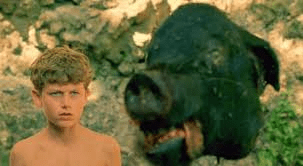
Simon, a loner, is basically supportive and insightful. When Ralph and Jack decide to investigate the island, Ralph chooses Simon to join them. Simon does so willingly, even though he has just recovered from a fainting spell. Although he says little, he offers Ralph his support on two occasions. The first takes place when Ralph considers giving up being chief. Simon concurs with Piggy that Ralph must continue filling that role. The second time follows the search for the beast on the other end of the island. Simon, seeing Ralph in a stranded and reflective mood, says that he thinks Ralph will get back all right, helping to dispel Ralph's fear. Simon also generously helps the littluns to get fruit from the trees, since they cannot reach it, and is the one boy who remains on the job to help Ralph complete the building of shelters. When the group is pondering the existence of beasts, Simon shows his insight by suggesting that if there is a beast, it’s in the boys themselves. Because of his shyness, Simon is not able to explain what he means. He is also the one boy of the group who is a loner, often preferring to seclude himself in the hidden space in the jungle. It is because of this characteristic that Simon witnesses the slaughter of the sow and subsequently engages in conversation with the Lord of Flies. His attempt to be the prophet of truth, once he has seen the parachutist, leads to his death, since the boys have become superstitious savages and no longer want truth.
4. What is Jack feeling as he and the three others trot toward Castle Rock? Why?
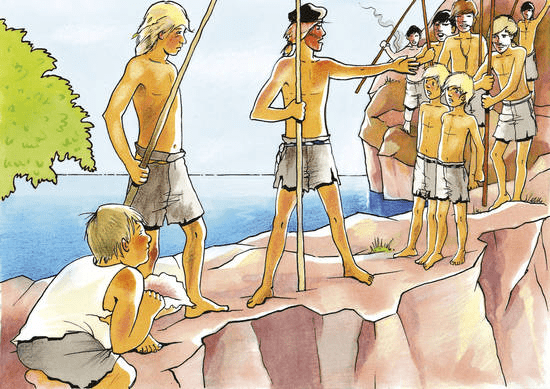
4. Jack is feeling that he is really a chief now because he has possession of Piggy’s glasses. Jack now has control of starting fires on the island and can defy Ralph by eliminating the signal fire, if he so chooses.
4. As Piggy and Ralph hurl questions at the savages, what is Roger doing?
4. From the lookout point, Roger is throwing stones at Piggy and Ralph with one hand, his other hand resting on the lever beneath the huge rock.
4. After Ralph reaches the beach and falls down, what does he see when he staggers to his feet?
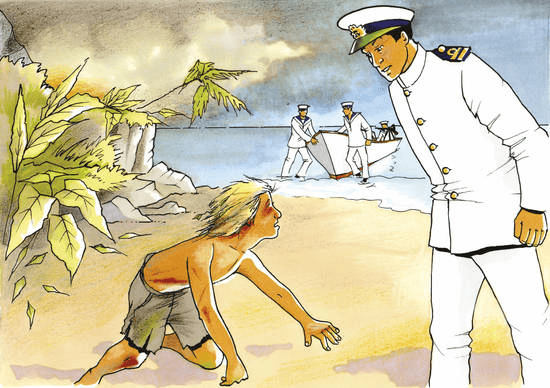
4. Ralph sees an astonished naval officer looking down at him.
11-7. When Ralph insists on accompanying Piggy to see Jack, he is afraid that Piggy will get hurt. a. Did you share the same fear? Why? b. What did Ralph think would happen to Piggy? c. What did you think would happen?
11-7. a) Jack’s pattern has been to eliminate his adversaries or usurp (by force) their power, so (b) Piggy’s death should not be a total surprise. The scene of Roger rolling the boulder was foreshadowed by the scene of him throwing rocks near the littluns. Roger, now a total savage, no longer aims to miss.
Discuss whether or not a successful society could be built if the leader possessed the combined traits of Ralph, Piggy, Jack, Simon, and even Roger.
Ralph, the elected leader; Jack, the hunter; Piggy, the brains; and Simon, the sear (see future events), all represent traits that are necessary for survival. Separated, they destroy each other as the group does Simon, and as Jack and Roger do Piggy and try to do Ralph. But properly integrated and balanced by each other, they add up to success. Ralph, the leader, is helpless without Simon’s inspirations and Piggy’s plans. Even Jack and Roger with all their power would be useless if they destroy all their drones and their environment. But if Ralph possessed Piggy’s and Simon’s ideas and Jack’s ability to carry through a plan, he would be a tidal, not a nominal (existing in name only), as long as he could suppress the unbridled urge of the Roger of men’s souls, the lord of the Flies.
5. While Ralph readies himself against a charge from Jack and his tribe, what does Roger do?
5. Roger deliberately and deliriously leans his weight on the lever beneath the great rock.
5. What explanation does the officer give?
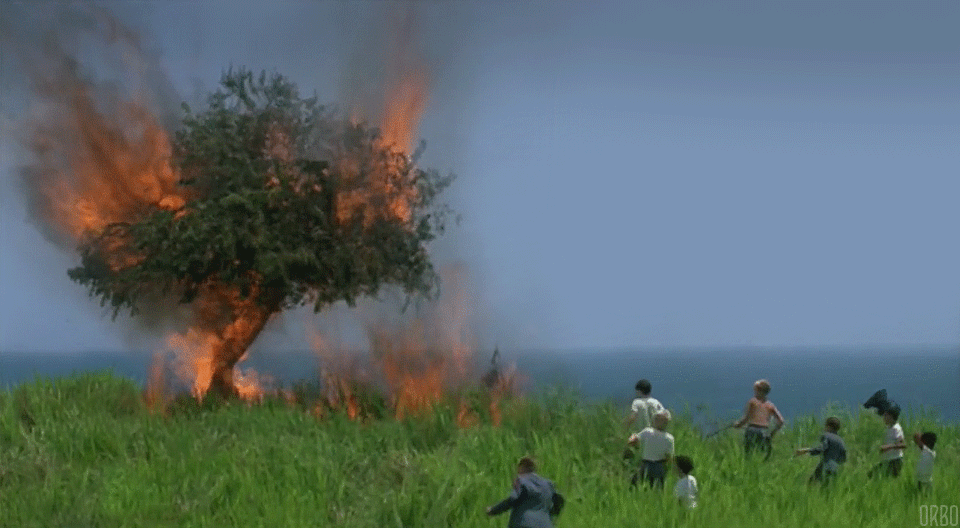
5. The officer explains that they had seen the boy’s smoke.
11-8. Both Piggy and Ralph made the mistake of believing they could reason with Jack about Piggy's glasses and the need for a signal fire. a. Why was their thinking completely erroneous? b. What had Jack clearly already become?
11-8. Piggy’s and Ralph’s assumption that they can reason with Jack is erroneous because
(a) he has already shown by taking Piggy’s glasses that he is beyond reason. Jack has clearly become (b) a savage since to get what he wants, he resorts to the use of force, instead of discussion, debate, or logical thought. None of his conditioned civilized behavior remains. He has begun to operate solely on the basis of self-fulfillment.
Discuss the author's use of adult warfare beyond the island to develop the plot of the novel.
Initially, Golding uses adult warfare as the catalyst (cause) for marooning the boys on the deserted island. It is because their plane was shot down that they find themselves in the situation they are in. According to Piggy, it is because an atomic bomb was dropped that they have little hope of being rescued, since the people who knew where they were are all dead. Later, the dead parachutist, one victim of the adult warfare above the island, comes to rest on the mountaintop. The sign of something grownup, that Ralph wishes for at the end of chapter five, becomes the beast and further heightens the steadily increasing tension among the boys. The body of the parachutist is also, indirectly, the cause of Simon’s death, since Simon is killed as a result of attempting to explain the beast to the others. Finally, the armed cruiser, a tangible sign of adult warfare, arrives to rescue the boys and save them from their own warfare.
6. What happens to the conch? b. To Piggy?
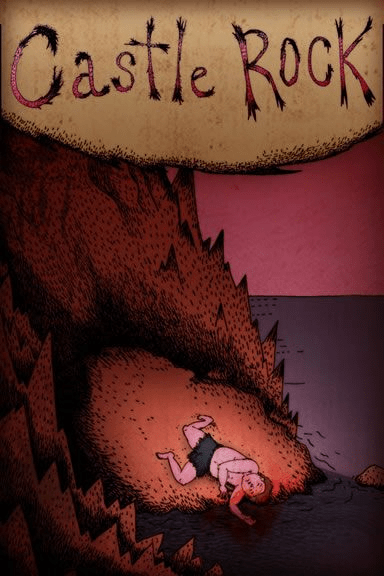
6. The rock strikes Piggy from chin to knee and (a) shatters the conch into countless fragments. The blow (b) knocks Piggy through the air, and he falls forty feet, landing on the square red rock in the sea. His head splits open and when the ocean rolls over the rock, it takes his body away.
6. Who responds to the officer's question about who is the boss?
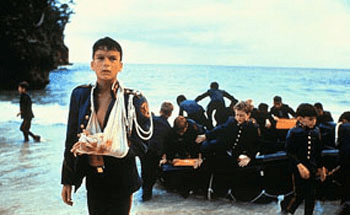
6. Ralph exclaims loudly that he is the boss.
11-10. a. With Ralph's two allies, Simon and Piggy, out of the picture and Sam and Eric now tribesmen, what are the odds that Ralph will survive? b. Will he, as Simon believed, get back all right? Why or why not?
11-10. In view of Ralph’s total aloneness and his former reliance on Piggy to do a certain amount of thinking for him, (a) it seems unlikely that Ralph will be able to survive. Simon’s prediction that Ralph will be able to survive. Simon’s prediction that Ralph will “get back all right” (b) seems totally unfounded at this point.
Discuss the cause of the conflict between Ralph and Jack, the results of that conflict, and how, or if, the conflict is resolved.
The cause of the conflict between Ralph and Jack primarily stems from Jack’s ego and arrogance. Jack assumes he will be chief of the group. Ralph tries to mollify Jack by allowing him to remain in charge of the choirboys. However, Jack’s disappointment slowly becomes a contained, unspoken hatred, which Piggy makes Ralph aware of. Ralph, with this insight, observes that Jack’s antagonism increases whenever he is not in charge. Finally, Jack’s ego compels him to try to depose (remove) Ralph. When he fails to achieve that goal, he breaks away from the group and becomes a professed and openly defiant opponent. Eventually, Jack and Ralph are pitted against each other in a life and death struggle. The conflict is not resolved. At the end of the novel, the naval officer halts Jack’s pursuit of Ralph. However, the conflict between them still exists. When the officer asks who the boss is, Jack, even then, considers challenging Ralph.
7. a. What do Roger's releasing of the huge rock and his strong-arm tactics with Sam and Eric indicate about the type of regime Jack has? b. How would you classify Jack and his tribe at this point?
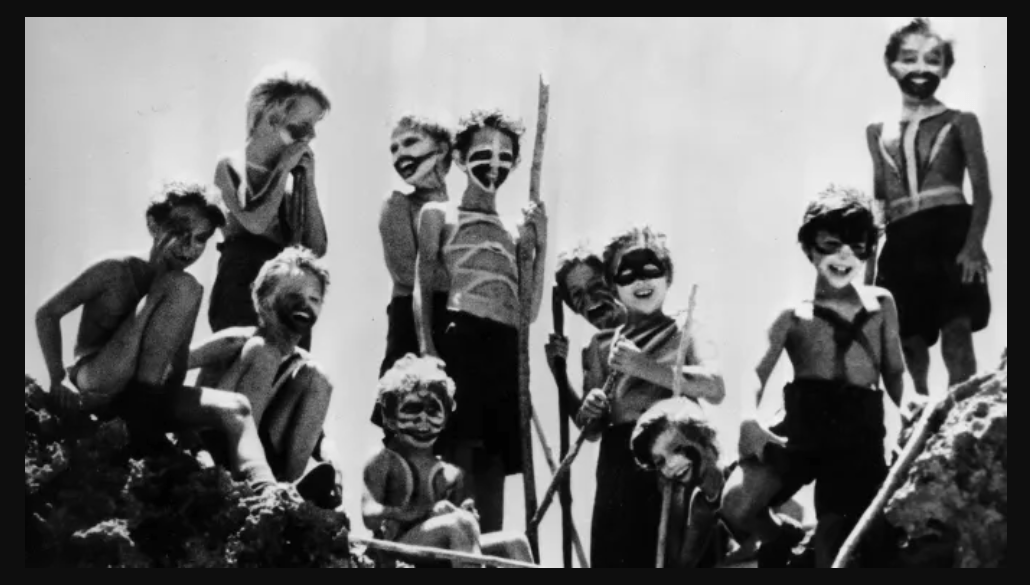
7. Jack and his henchmen employ whatever means are necessary to achieve their ends. The regime is based on (a) fear and intimidation. Piggy is still a possible threat to their system, since he might be able to reach the tribesmen through reasoning, so Roger coldly eliminates him. At this point, Jack and his tribe are (b) ruthless, savage animals, who have lost all vestiges (no longer exist) of civilized behavior.
7. What does the little boy with the remains of a black cap on his red hair and a broken pair of spectacles at his waist do?
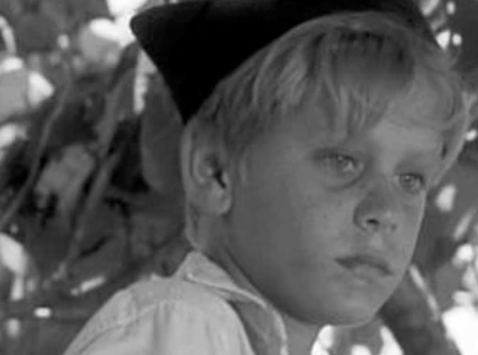
7. The little boy starts forward, changes his mind, and stands still.
12-10. How do you react to the naval officer’s appearance?
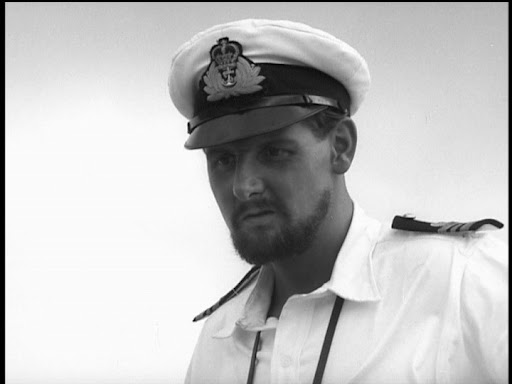
Ralph had been right all along–their only hope of rescue was to have a strong signal fire that might be spotted by a ship. Although Jack and his tribesmen set fire to smoke Ralph out of hiding to kill him, the fire turned out to be Ralph’s salvation and perhaps that of the other boys as well.
8. When Ralph finally begins to sob uncontrollably, what is he weeping for?
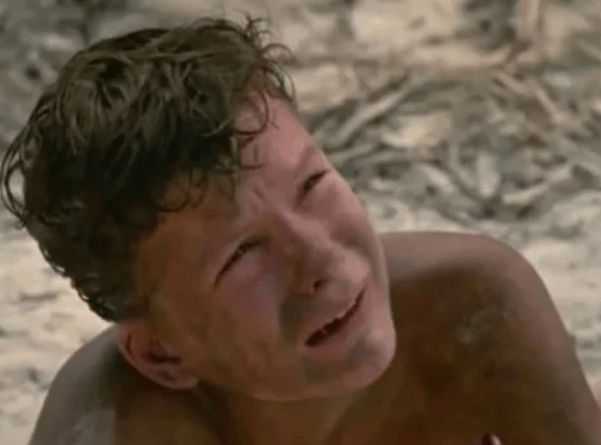
8. Ralph is weeping for the end of innocence, the death of Piggy, and the discoveries he made about the nature of the human heart.
12-11. Why do you think Golding describes the savages as "little boys on the beach" and Jack in particular as a "little boy"? What point do you think he is trying to convey to the reader with this shift in wording?
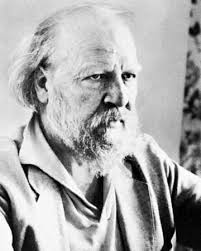
Golding probably intends for the reader to become aware, once again, of who these characters really are–young English schoolboys, reacting as they did in the past to an authority figure. They may have become savages and committed beastly, violent acts, but the arrival of the cutter and the naval officer quickly returns them to their for subservience (willingness to obey).
12-12. Consider Piggy's comment about the atom bomb having been dropped, the dead parachutist, and the arrival of the naval cruiser. (a) Why is the cruiser in the area?
(b) What will it continue to do once the boys have been transported back home? (c) What parallel is there between what has been going on in the adult world -and what has occurred on the island? Explain.
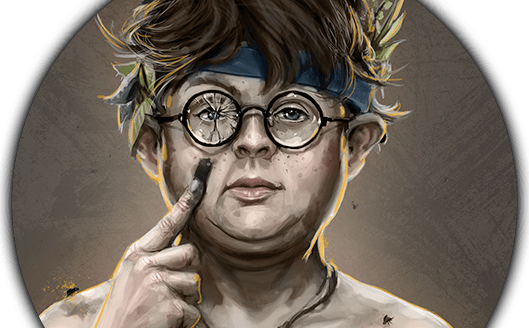
12-12. Quite obviously the naval cruiser, armed with its sub-machine gun, is in the area because of (a) the warfare that is occurring. Although the reader doesn’t know who is fighting whom, Piggy’s comment about the (b) bomb being dropped indicates the seriousness of the situation beyond the island. The descent of the dead parachutist further exemplifies the severity of the conflict. The adult warfare is parallel to what occurs on the island among the boys. (c) Just as Ralph and Jack are unable to resolve their differences through the civilized application of reason and logic, the adults have also resorted to using violent acts to prove who is right.